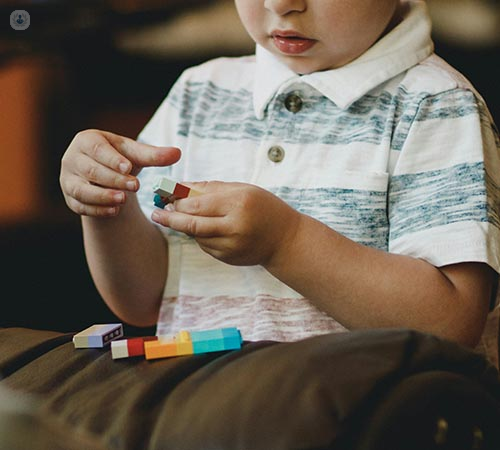Paediatric psoriasis: A parent’s guide
Written in association with:Psoriasis is a chronic skin condition where skin cells grow at an accelerated rate, leading to red, scaly patches on the skin’s surface. In children, this condition is known as paediatric psoriasis. Although psoriasis is more commonly seen in adults, children and even infants can develop it. This skin disorder is not contagious; it’s linked to immune system activity, which causes inflammation and rapid skin cell turnover. While it can be difficult to identify in children, recognising the signs and understanding the triggers can help manage the condition effectively.
Leading dermatologist Dr Wedad Abdelraham explains paediatric psorasis, including when to seek help.

What are the principal signs and symptoms of psoriasis in children?
Paediatric psoriasis can look different from adult psoriasis. In children, you may notice red patches or spots covered with white or silvery scales, typically on the scalp, elbows, knees, and lower back, though it can appear anywhere on the body. The affected areas are often itchy, and scratching can worsen the appearance of the skin. Some children experience “guttate psoriasis,” which causes small, drop-like lesions after a bacterial infection such as a sore throat. Plaque psoriasis, another common type, presents as thicker, scaly patches. If you notice such symptoms, consult a dermatologist to confirm a diagnosis.
What causes paediatric psoriasis?
Psoriasis has a strong genetic component, meaning it tends to run in families. However, not all children with a family history will develop it. Triggers, including infections, stress, skin injuries (like cuts or scrapes), and even cold weather, can activate psoriasis in a child who is genetically predisposed. The immune system misfires, mistakenly attacking the skin, which then leads to increased production of skin cells and the characteristic patches.
Is paediatric psoriasis manageable?
While there is no cure for psoriasis, various treatment options can manage symptoms and reduce flare-ups. For mild cases, topical treatments, such as emollient creams and ointments containing steroids, can soothe inflammation and reduce scaling. For more persistent cases, doctors may prescribe stronger treatments, including phototherapy (light therapy) or oral medications. It is important to work closely with your child’s healthcare provider to find a treatment plan that fits their needs.
How can you support a child with psoriasis?
Living with psoriasis can affect a child’s self-esteem, particularly if the patches are visible. Encouraging your child to talk about their feelings and reassuring them that psoriasis is a common condition can help build resilience. Moisturising daily, using gentle skin products, and helping your child avoid triggers—like harsh soaps or certain fabrics—can improve skin health. Educating family members, teachers, and friends can also create a more supportive environment, which can be very helpful in managing paediatric psoriasis.
If you would like to book a consultation with Dr Abdelraham, do not hesitate to do so by visiting her Top Doctor's profile today.



